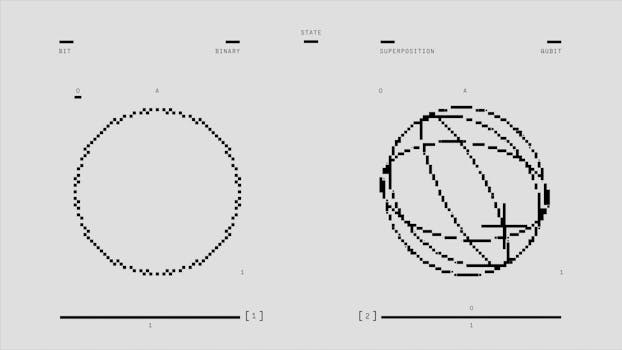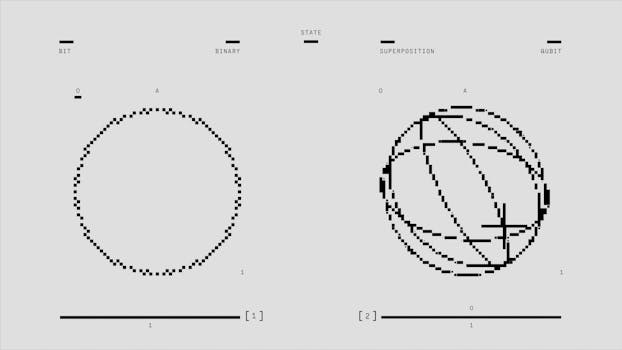Revolutionizing Cryptography: How Quantum Computing Threatens Traditional Security
Quantum computing, a rapidly advancing field at the intersection of physics and computer science, is poised to revolutionize numerous industries. Among the most profoundly affected areas is cryptography, the backbone of modern digital security. As quantum computers evolve in capability, they threaten to undermine the very foundations of traditional encryption methods that currently safeguard everything from personal communications to global financial systems.
To understand the magnitude of this threat, it is essential to first consider how classical cryptographic systems function. Most widely used encryption protocols, such as RSA and ECC (Elliptic Curve Cryptography), rely on the computational difficulty of certain mathematical problems. For instance, RSA encryption is based on the challenge of factoring large prime numbers, a task that is practically impossible for classical computers to perform within a reasonable timeframe. This computational difficulty ensures the security of encrypted data, as breaking the code would require an infeasible amount of time and resources.
However, the advent of quantum computing introduces a paradigm shift. Unlike classical computers, which process information in binary bits, quantum computers use quantum bits, or qubits, which can exist in multiple states simultaneously due to the principles of superposition and entanglement. This allows quantum computers to perform complex calculations at speeds exponentially faster than their classical counterparts. In 1994, mathematician Peter Shor developed a quantum algorithm capable of factoring large integers exponentially faster than the best-known classical algorithms. Known as Shor’s algorithm, this breakthrough demonstrated that a sufficiently powerful quantum computer could effectively break RSA and ECC encryption, rendering them obsolete.
The implications of this are far-reaching. If traditional encryption methods can be broken, then the confidentiality and integrity of sensitive data—ranging from government secrets to personal banking information—are at risk. Moreover, the threat is not limited to future communications. Adversaries could potentially harvest encrypted data today with the intention of decrypting it later, once quantum computers become powerful enough. This concept, known as “harvest now, decrypt later,” underscores the urgency of developing quantum-resistant cryptographic solutions.
In response to this looming threat, researchers and institutions around the world are working to develop post-quantum cryptography—encryption methods designed to be secure against both classical and quantum attacks. The National Institute of Standards and Technology (NIST) has been leading an international effort to standardize such algorithms, with several candidates already in the final stages of evaluation. These new cryptographic systems are based on mathematical problems believed to be resistant to quantum attacks, such as lattice-based, hash-based, and multivariate polynomial cryptography.
Transitioning to quantum-resistant encryption, however, is not without challenges. It requires not only the development of new algorithms but also the widespread implementation of these systems across existing digital infrastructure. This process involves updating software, hardware, and protocols on a global scale—a task that demands significant time, resources, and coordination.
Nevertheless, the urgency of the situation cannot be overstated. As quantum computing continues to advance, the window for proactive adaptation is narrowing. Organizations must begin preparing now to ensure that their data remains secure in a post-quantum world. In this context, quantum computing is not just a technological breakthrough; it is a catalyst for a fundamental transformation in how we approach digital security.
Transforming Drug Discovery: Quantum Computing’s Role in Accelerating Medical Breakthroughs

Quantum computing, a rapidly advancing field at the intersection of physics and computer science, is poised to revolutionize numerous industries, with drug discovery standing out as one of the most promising areas for transformation. Traditional drug development is a complex, time-consuming, and costly process, often taking over a decade and billions of dollars to bring a single new drug to market. This inefficiency stems largely from the limitations of classical computers in simulating molecular interactions with high precision. However, quantum computing offers a fundamentally different approach, one that could dramatically accelerate the pace of medical breakthroughs.
At the heart of drug discovery lies the need to understand how molecules behave and interact at the quantum level. Classical computers struggle with this task because the number of possible configurations for even a modestly sized molecule quickly becomes astronomically large. Quantum computers, on the other hand, are uniquely suited to handle such complexity. By leveraging the principles of superposition and entanglement, quantum systems can process and analyze vast amounts of molecular data simultaneously, enabling researchers to model molecular structures and reactions with unprecedented accuracy.
This capability has profound implications for identifying potential drug candidates. Instead of relying on trial-and-error methods or simplified models, scientists can use quantum algorithms to simulate the behavior of drug molecules in realistic biological environments. As a result, they can predict how a compound will interact with a target protein, assess its efficacy, and identify possible side effects—all before conducting a single laboratory experiment. This not only reduces the time and cost associated with early-stage drug development but also increases the likelihood of success in later clinical trials.
Moreover, quantum computing can facilitate the discovery of entirely new classes of drugs. For diseases that have proven resistant to conventional treatments, such as certain cancers or neurodegenerative disorders, quantum simulations can uncover novel molecular pathways and mechanisms of action. By exploring chemical spaces that are currently inaccessible to classical methods, researchers may identify innovative therapeutic strategies that were previously unimaginable.
In addition to accelerating the discovery process, quantum computing can also enhance personalized medicine. By integrating quantum simulations with patient-specific genetic and biochemical data, it becomes possible to design drugs tailored to an individual’s unique biological profile. This level of precision could lead to more effective treatments with fewer side effects, marking a significant shift from the one-size-fits-all approach that dominates much of modern medicine.
While the full realization of quantum computing’s potential in drug discovery is still on the horizon, early collaborations between quantum technology firms and pharmaceutical companies are already yielding promising results. As quantum hardware continues to improve and quantum algorithms become more sophisticated, the integration of these tools into the drug development pipeline is expected to grow. In the coming years, we may witness a paradigm shift in how new medicines are discovered, tested, and brought to market.
In conclusion, quantum computing represents a transformative force in the field of drug discovery. By enabling more accurate molecular simulations, uncovering novel therapeutic targets, and supporting personalized treatment strategies, it holds the promise of accelerating medical breakthroughs and improving health outcomes on a global scale.
Redefining Artificial Intelligence: Quantum Algorithms Powering the Next Generation of AI
As the field of quantum computing continues to evolve, its potential to revolutionize artificial intelligence (AI) is becoming increasingly apparent. Traditional AI systems, while powerful, are fundamentally limited by the capabilities of classical computing. These limitations become especially pronounced when dealing with complex problems involving vast datasets, intricate pattern recognition, or high-dimensional optimization. Quantum computing, with its ability to process information in fundamentally different ways, offers a transformative approach that could redefine the very foundations of AI.
At the heart of this transformation lies the concept of quantum algorithms. Unlike classical algorithms that operate on binary bits, quantum algorithms leverage quantum bits, or qubits, which can exist in multiple states simultaneously due to the principle of superposition. This allows quantum computers to perform many calculations at once, dramatically increasing computational efficiency. Furthermore, the phenomenon of entanglement enables qubits to be interconnected in ways that allow for more sophisticated data correlations and faster information processing. These unique properties make quantum algorithms particularly well-suited for tasks that are computationally intensive or intractable for classical systems.
One of the most promising applications of quantum algorithms in AI is in the area of machine learning. Quantum machine learning (QML) seeks to harness quantum computing to accelerate the training of models, improve pattern recognition, and enhance decision-making processes. For instance, quantum-enhanced support vector machines and quantum neural networks are being explored as ways to process and analyze data more efficiently than their classical counterparts. These advancements could lead to AI systems that learn faster, adapt more effectively, and make more accurate predictions, even when dealing with incomplete or noisy data.
Moreover, quantum computing holds significant promise for optimization problems, which are central to many AI applications. From logistics and supply chain management to natural language processing and autonomous systems, optimization is a critical component. Quantum algorithms such as the Quantum Approximate Optimization Algorithm (QAOA) and Grover’s algorithm offer new methods for finding optimal solutions more quickly and accurately. This could enable AI systems to solve problems that were previously considered too complex or time-consuming, thereby expanding the scope of what AI can achieve.
In addition to optimization, quantum computing may also enhance AI’s ability to model complex systems. Classical simulations of molecular structures, financial markets, or climate systems often require immense computational resources. Quantum computers, however, can simulate these systems more naturally and efficiently, providing AI with richer and more accurate data to inform its models. This synergy between quantum simulation and AI could lead to breakthroughs in fields such as drug discovery, materials science, and environmental modeling.
As we look to the future, the integration of quantum computing and AI is poised to create a new paradigm in computational intelligence. While practical, large-scale quantum computers are still in development, ongoing research and early prototypes are already demonstrating the feasibility of quantum-enhanced AI. As these technologies mature, we can expect a profound shift in how AI systems are designed, trained, and deployed. Ultimately, quantum computing is not just an incremental improvement—it represents a fundamental leap forward that will redefine the capabilities and applications of artificial intelligence in the years to come.



